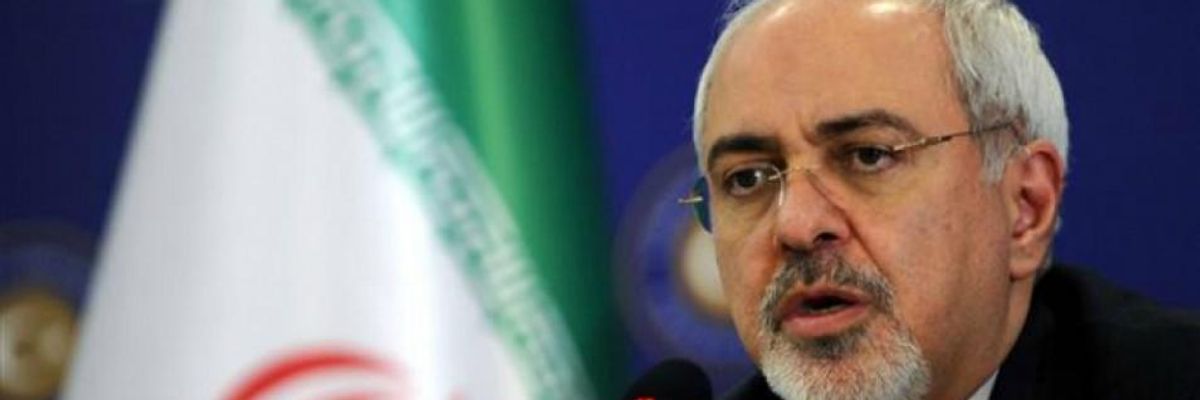Iran's Foreign Ministry said Monday that an attack on its Natanz nuclear facility over the weekend, which it accused Israel of carrying out, could have led to a catastrophic "crime against humanity" if the damage had been more extreme than what occurred.
"If Israel is behind this while [Defense Secretary] Austin visits Israel this is shameless. Iran and the U.S. can't let this derail diplomacy. Time to put in place a return to the JCPOA."
--Jon Rainwater, Peace Action
Speaking during an online news conference with Iranian news outlets, Foreign Ministry spokesman Saeed Khatibzadeh said, "Gladly there was no human or environmental damage, but it could have certainly" been worse.
Characterizing Sunday's incident as "appalling" and an act of "sabotage" by the Israeli government, Khatibzadeh said what "took place in Natanz was the work of the Zionist regime, given what it was repeatedly saying before and what is still being heard from various sources."
During his remarks, the spokesperson said older-generation centrifuges taht were damaged in the attack would be replaced by newer ones going forward.
Speaking at the same press conference, Iranian Foreign Minister Mohammad Javad Zarif said the attack would not go unanswered even as he referenced ongoing diplomatic talks with European leaders and the United States to reforge the nuclear agreement abandoned by former U.S. President Donald Trump.
The Israeli government "want to take revenge because of our progress in the way to lift sanctions... they have publicly said that they will not allow this." Zarif said. "But we will take our revenge from the Zionists."
The attack on Natanz, reportedly carried out by Mossad, involved an explosion that reportedly caused a power blackout across the facility and damaged centrifuges used to enrich uranium.
According to the New York Times:
The Israeli government formally declined to comment on its involvement, but American and Israeli officials confirmed separately to The New York Times that Israel had played a role. Several Israeli news outlets, citing intelligence sources, attributed the attack to the Mossad, the Israeli spy agency.
Policy experts and anti-war voices noted that the obvious motivation for the Israelis, if they were behind the attack, was to complicate ongoing efforts by the Iranians to compel President Joe Biden to rejoin the Joint Comprehensive Plan of Action (JCPOA), the 2015 agreement forged under the Obama administration and the subject of renewed talks last week in Vienna.
In a statement to the Washington Post, a Biden administration official said the U.S. "had no involvement, and we have nothing to add to speculation about the causes," but outside critics said Israel's attack against Iran's nuclear program--like others in the past--was designed to influence the foreign policy trajectory of its longtime ally and benefactor.
Jamal Abdi, executive director of the National Iranian-American Council (NIAC), tweeted:
As Trita Parsi, executive vice president for the Quincy Insitute of Responsible Statecraft, a foreign policy think tank, wrote in a thread on social media overnight that the presence of U.S. Secretary of Defense Lloyd Austin in Jerusalem when the attack took place is likely no coincidence--even as outlets like the Guardianreported it precisely that way.
"The fact that Israel launched this attack (acc to the NYT) while [Austin] was in Israel seem to have been calculated to both confuse Iran (was the U.S. in on it?) and to embarrass Biden," argued Parsi.
Parsi further said that Prime Minister Benjamin Netanyahu has shown that Israel is "clearly willing to boldly undermine Biden if he seeks to advance the interest of the United States" by reaching a fresh agreement with Tehran on its nuclear program. "Biden's failure to exact a cost on Bibi for undermining him is precisely why [Netanyahu] will continue to do it."
Jon Rainwater, executive director of the U.S.-based Peace Action, said the focus of the Biden administration must be the diplomatic effort.
"This is sabotage all right," tweeted late Sunday night about the attack on Natanz. "But the target is Biden's diplomacy with Iran. If Israel is behind this while [Defense Secretary] Austin visits Israel this is shameless. Iran and the U.S. can't let this derail diplomacy. Time to put in place a return to the JCPOA."

